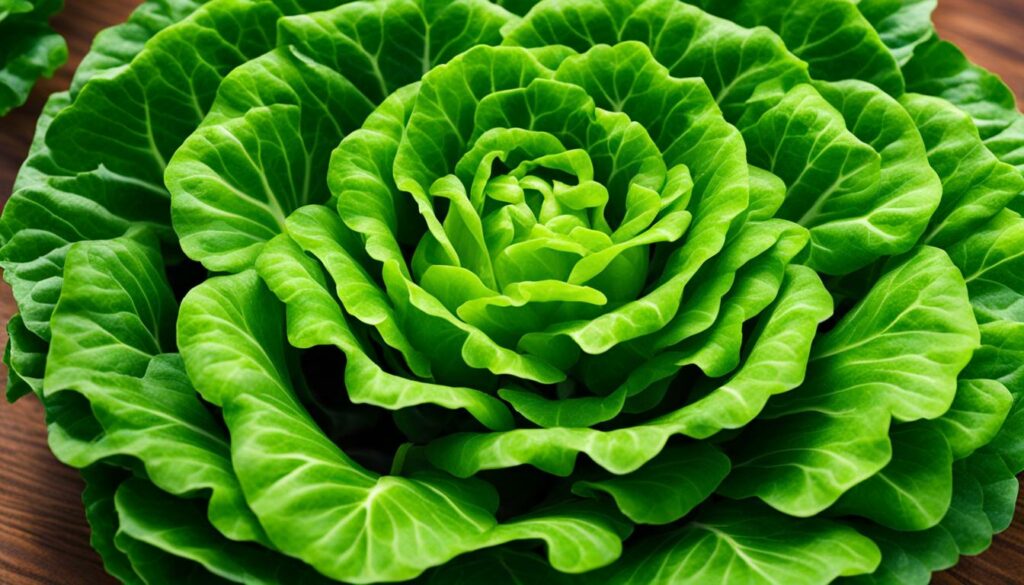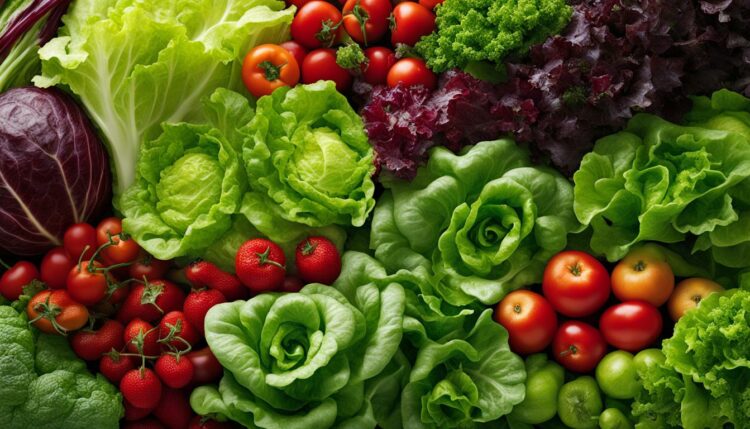Lettuce (Lactuca sativa) is a leafy green plant belonging to the daisy family, Asteraceae. Originating in the Mediterranean region, it is one of the oldest cultivated crops known to humankind, with its cultivation dating back over 4,000 years.
Lettuce is a low-calorie vegetable that offers a range of essential nutrients, including vitamins A, K, and C. It is also a good source of dietary fiber, providing hydration due to its high water content.
Additionally, lettuce contains various minerals, such as potassium and calcium. Lettuce is incredibly versatile in the kitchen and can be used in various ways like salads, wraps, sandwiches, and smoothies. It is an excellent choice for weight management, supports digestive health, and promotes hydration.
Key Takeaways:
- Lettuce is a nutrient-dense vegetable packed with vitamins A, K, and C, as well as minerals like potassium and calcium.
- Being low in calories and high in water content, lettuce is beneficial for weight management and hydration.
- The dietary fiber in lettuce supports digestive health and regular bowel movements.
- Lettuce is versatile and can be incorporated into various meals, making it an easy addition to a healthy diet.
- Overall, leaf lettuce offers numerous health advantages and can contribute to a well-rounded, nutritious lifestyle.
Weight Management with Leaf Lettuce
Lettuce is a fantastic option for weight management, making it an ideal addition to your diet when looking to shed those extra pounds. With its low-calorie content and high water content, lettuce allows you to enjoy satisfying meals without compromising your calorie control efforts.
The high fiber content in lettuce plays a crucial role in weight loss by promoting a feeling of fullness, reducing the temptation to overeat. By incorporating leaf lettuce into your meals, you can create balanced and nutritious dishes while effectively managing your weight.
To fully understand the weight management benefits of leaf lettuce, let’s take a closer look at its nutritional profile. On average, leaf lettuce contains approximately 5 calories per cup, making it an incredibly low-calorie food choice.
Furthermore, its high water content contributes to its weight management advantages. Water-rich foods like leaf lettuce add volume to your meals without significantly increasing their calorie count, allowing you to enjoy larger portions without compromising your weight loss goals.
| Nutrient | Amount per Cup (Approx.) |
|---|---|
| Calories | 5 |
| Fat | 0g |
| Carbohydrates | 1g |
| Fiber | 1g |
| Protein | 1g |
In addition to its low calorie and high water content, leaf lettuce is also an excellent source of fiber. The high fiber content aids digestion and helps regulate blood sugar levels, playing a pivotal role in weight management.
By incorporating leaf lettuce into your meals, you can promote healthy digestion and maintain stable blood sugar levels, which is crucial for preventing cravings and overeating.
To maximize the weight management benefits of leaf lettuce, consider incorporating it into a variety of dishes. Use leaf lettuce as a base for salads, add it to wraps and sandwiches, or blend it into refreshing smoothies.
The versatility of leaf lettuce allows you to enjoy satisfying meals while keeping your calorie intake under control.
Antioxidant Benefits of Leaf Lettuce
Leaf lettuce is a powerhouse of antioxidants, making it a valuable addition to a healthy diet. This variety of lettuce is particularly rich in vitamins A and C, both of which play a crucial role in combating free radicals and reducing oxidative stress in the body.
The antioxidants found in leaf lettuce help protect your cells from damage caused by free radicals. Free radicals are unstable molecules that can harm your body’s cells and contribute to various health problems, including inflammation, aging, and chronic diseases.
By incorporating leaf lettuce into your meals, you can enjoy the benefits of these antioxidants, promoting overall health and well-being. The vitamins A and C present in leaf lettuce help neutralize free radicals, preventing cell damage and reducing the risk of chronic diseases.
Antioxidants also play a vital role in supporting a healthy immune system. They help strengthen your body’s defense mechanisms, enabling it to fight off infections and illnesses more effectively.
To maximize the antioxidant benefits of leaf lettuce, consider combining it with other fruits and vegetables high in antioxidants. This way, you can create a colorful and nutritious meal that supports your immune system and protects your body from oxidative stress.
Leaf lettuce is not only delicious but also a great source of antioxidants, essential nutrients that help protect your body from free radicals and maintain good health.
To highlight the antioxidant benefits of leaf lettuce, let’s take a closer look at the role of vitamins A and C in the body:
Vitamin A: A Powerful Antioxidant
Vitamin A is an essential nutrient that acts as a powerful antioxidant in the body. It helps protect cells from free radical damage and supports immune function.
Additionally, vitamin A plays a crucial role in maintaining healthy vision, promoting skin health, and supporting reproductive health. Including leaf lettuce in your diet can help ensure an adequate intake of vitamin A and its associated benefits.
Vitamin C: A Key Antioxidant for Immunity
Vitamin C is well-known for its immune-boosting properties. As an antioxidant, vitamin C helps strengthen your immune system, enabling it to fight off infections and illnesses.
It also plays a vital role in collagen synthesis, which is crucial for healthy skin, bones, and blood vessels. By consuming leaf lettuce, you can increase your vitamin C intake and enhance your body’s ability to combat free radicals and support overall health.
By incorporating leaf lettuce into your diet, you can enjoy the antioxidant benefits of vitamins A and C, promoting cellular health, supporting your immune system, and reducing the risk of chronic diseases.
So, next time you’re at the grocery store, don’t forget to grab a bunch of fresh leaf lettuce and add it to your favorite dishes!

Bone Health and Leaf Lettuce
Leaf lettuce not only adds a refreshing crunch to your salads but also offers significant benefits for your bones. It is a good source of vitamin K, which plays a crucial role in bone health. Vitamin K is involved in bone metabolism and helps in the production of proteins necessary for proper bone formation.
Moreover, leaf lettuce contains a noteworthy amount of calcium, a mineral that is essential for maintaining strong and healthy bones. Calcium is a key component of bone structure and plays a vital role in supporting bone density and strength.
By incorporating leaf lettuce into your diet, you can provide your body with the necessary nutrients to support bone health and reduce the risk of bone-related conditions.
The Importance of Vitamin K for Bones
Vitamin K is essential for bone health as it helps regulate calcium and maintain bone mineral density. It activates proteins involved in bone formation, including osteocalcin, which binds calcium to the bone matrix.
Without sufficient vitamin K, calcium may not be properly utilized by the bones, leading to decreased bone density and increased risk of fractures.
The Calcium Content in Leaf Lettuce
Leaf lettuce contains a moderate amount of calcium, contributing to your daily calcium intake. Calcium is crucial for maintaining the structural integrity of bones and teeth, and it also plays a role in muscle function and nerve transmission.
Including leaf lettuce in your diet can be an excellent way to boost your calcium intake, especially for individuals who may not consume dairy products or other calcium-rich foods.
Vitamin K and calcium in leaf lettuce work together to support strong and healthy bones. By incorporating this leafy green into your meals, you can nourish your bones and promote optimal bone health.
Hydration and Leaf Lettuce
Leaf lettuce, also known as Lactuca sativa, is not only a versatile ingredient in your meals but also a valuable source of hydration. With its high water content, leaf lettuce can help you maintain optimal hydration levels and support overall health.
Staying properly hydrated is crucial for your body to function optimally. Water plays a vital role in regulating body temperature, lubricating joints, transporting nutrients, and flushing out waste products.
By consuming water-rich foods like leaf lettuce, you can contribute to your daily hydration needs and keep your body in balance.
Leaf lettuce contains approximately 95% water, making it an excellent choice for maintaining hydration levels. Just one cup of leaf lettuce provides about 5 ounces (150 ml) of water, helping you stay refreshed and hydrated throughout the day.
Incorporating leaf lettuce into your meals is simple and delicious. You can enjoy it as a green salad, add it to sandwiches, wraps, or blend it into a refreshing smoothie. The versatility of leaf lettuce allows you to use it in various dishes to enhance the water content.
By choosing leaf lettuce for hydration, you not only increase your daily water intake but also benefit from its nutritional value. Leaf lettuce is rich in vitamins A, K, and C, as well as minerals like potassium and calcium. These nutrients support various bodily functions and contribute to overall well-being.
“Leaf lettuce’s high water content makes it an excellent choice for maintaining hydration levels in the body.”
Leaf Lettuce Water Content Comparison
To better understand the water content in leaf lettuce, let’s compare it with other vegetables:
| Vegetable | Water Content |
|---|---|
| Lettuce (Iceberg) | 95% |
| Cucumber | 96% |
| Watermelon | 92% |
| Tomato | 94% |
As you can see from the table, leaf lettuce ranks high in water content, making it an excellent choice for hydration. Incorporating leaf lettuce into your diet can provide a refreshing and hydrating boost while delivering essential nutrients.
So, the next time you’re looking for a hydrating and nutritious food option, reach for leaf lettuce. Whether enjoyed as a standalone salad or used as a flavorful ingredient, leaf lettuce can help you maintain optimal hydration levels and support overall health.
“Incorporating leaf lettuce into your meals can provide a refreshing and hydrating boost while delivering essential nutrients.”
Digestive Health and Leaf Lettuce
Leaf lettuce, a delicious and nutritious leafy green, plays a vital role in promoting a healthy digestive system. With its abundance of dietary fiber, leaf lettuce keeps your digestive system running smoothly and efficiently.
The fiber found in leaf lettuce adds bulk to the stool, helping to prevent constipation and promote regular bowel movements. By including leaf lettuce in your diet, you can support healthy digestion and maintain a well-functioning digestive tract.
But that’s not all! Leaf lettuce also contributes to gut health by providing nourishment for beneficial gut bacteria. These friendly bacteria help break down food and aid in the digestion and absorption of nutrients.
So, why not incorporate leaf lettuce into your meals and enjoy its benefits for your digestive system? Whether it’s a refreshing salad or a tasty wrap, leaf lettuce is a versatile and flavorful addition to any diet.
How Fiber in Leaf Lettuce Supports Digestive Health
Fiber is an essential nutrient for maintaining a healthy digestive system, and leaf lettuce is an excellent source of it. Here’s how the fiber in leaf lettuce contributes to digestive health:
- Adding Bulk: The fiber in leaf lettuce adds bulk to the stool, promoting regular bowel movements and preventing constipation.
- Improving Digestion: Fiber helps in the digestion process by keeping things moving smoothly through the digestive tract.
- Feeding Beneficial Bacteria: Leaf lettuce serves as a prebiotic, providing nourishment for beneficial gut bacteria. These bacteria play a crucial role in maintaining gut health and overall well-being.
Incorporating leaf lettuce into your diet is a simple yet effective way to support healthy digestion and maintain a happy gut!
| Nutrient | Amount per 100g serving |
|---|---|
| Calories | 10 |
| Fiber | 1.3g |
| Vitamin A | 148% of the Daily Value (DV) |
| Vitamin C | 8% of the DV |
| Vitamin K | 97% of the DV |
| Potassium | 194mg |
| Calcium | 36mg |
As you can see from the table above, leaf lettuce is not only low in calories but also a good source of essential nutrients that contribute to overall health. Its fiber content, in particular, makes it a valuable food for promoting healthy digestion.
So, make leaf lettuce a regular part of your diet and enjoy the benefits it brings to your digestive health!
Red Leaf Lettuce Health Benefits
Red leaf lettuce, a variety of lettuce, offers numerous health benefits. It is high in nutrients, including vitamins and minerals, while being low in calories. Red leaf lettuce is a great source of antioxidants, keeps the body hydrated, supports heart health, lowers blood pressure, and promotes weight loss. With its high fiber content and adequate nutrient profile, red leaf lettuce is a valuable addition to a healthy diet.
Antioxidant Powerhouse
Red leaf lettuce is packed with antioxidants, including vitamins A and C. These antioxidants help combat free radicals in the body, protecting cells from oxidative stress and reducing the risk of chronic diseases.
Hydration Booster
Due to its high water content, red leaf lettuce is an excellent food for maintaining hydration levels. Staying properly hydrated is important for overall health, and incorporating water-rich foods like red leaf lettuce can contribute to meeting your daily hydration needs.
Heart Health Support
The nutrients present in red leaf lettuce, such as potassium and vitamins A and C, contribute to heart health. Potassium helps regulate blood pressure, while vitamins A and C provide antioxidant support, reducing the risk of heart disease.
Weight Loss Aid
Red leaf lettuce is low in calories, making it an ideal choice for weight loss. Its high fiber content helps promote feelings of fullness and satiety, aiding in appetite control and calorie management.
| Nutrient | Amount per 100g |
|---|---|
| Calories | 16 |
| Carbohydrates | 3g |
| Fiber | 1g |
| Protein | 1g |
| Vitamin A | 6330 IU |
| Vitamin C | 9mg |
| Calcium | 36mg |
| Potassium | 222mg |
Table: Nutritional Value of Red Leaf Lettuce per 100g
With its vibrant color, crisp texture, and numerous health benefits, red leaf lettuce is a delicious and nutritious option to incorporate into your meals. Whether in salads, sandwiches, wraps, or smoothies, red leaf lettuce brings both flavor and wellness to your plate.

Conclusion
Leaf lettuce is a nutrient-rich vegetable that provides a wide array of health benefits. Whether you are looking to manage your weight, support bone health, promote hydration, or improve digestion, incorporating leaf lettuce into your daily diet can help you achieve these goals.
With its versatility and delicious taste, leaf lettuce can be easily incorporated into various dishes, such as salads, wraps, sandwiches, and smoothies.
By consuming leaf lettuce, you can enjoy the advantages it offers, including its high fiber content, essential vitamins, and minerals. Leaf lettuce is a low-calorie food that can help you maintain a healthy weight and provide a feeling of fullness, thanks to its water content.
It is also a valuable source of antioxidants, which protect your cells from free radical damage and support your immune system.
If you are concerned about your bone health, leaf lettuce is an excellent choice due to its vitamin K and calcium content. Vitamin K is essential for bone metabolism, while calcium is crucial for maintaining strong and healthy bones.
Additionally, incorporating leaf lettuce into your meals can contribute to proper hydration and support a healthy digestive system.
Incorporating leaf lettuce into your diet is a simple and effective way to boost your overall well-being. With its numerous health benefits and versatility in the kitchen, leaf lettuce is an excellent addition to any healthy eating plan. So, why wait? Start incorporating leaf lettuce into your meals today and reap its incredible advantages!
FAQ
What are the health benefits of leaf lettuce?
Leaf lettuce offers numerous health benefits, including weight management, antioxidant support, bone health, hydration, and digestive health.
How can leaf lettuce help with weight management?
Leaf lettuce is low in calories and high in water content, which can add bulk to meals without significantly increasing calorie intake. Its high fiber content also helps you feel full, reducing the chances of overeating.
What are the antioxidant benefits of leaf lettuce?
Leaf lettuce is rich in antioxidants, such as vitamins A and C, which help combat free radicals in the body and reduce oxidative stress. Consuming leaf lettuce can protect cells from damage and promote overall health.
How does leaf lettuce support bone health?
Leaf lettuce contains vitamin K, which plays a key role in bone metabolism and the production of proteins necessary for proper bone formation. It also contains calcium, another important nutrient for maintaining strong and healthy bones.
Can leaf lettuce help with hydration?
Yes, leaf lettuce has a high water content, making it an excellent food for maintaining hydration levels in the body. Consuming water-rich foods like leaf lettuce can contribute to your daily hydration needs.
How does leaf lettuce support digestive health?
Leaf lettuce is a good source of dietary fiber, which adds bulk to the stool, promotes regular bowel movements, and prevents constipation. It also contributes to gut health by providing food for beneficial gut bacteria.
What are the health benefits of red leaf lettuce?
Red leaf lettuce, a variety of lettuce, offers numerous health benefits. It is high in nutrients, low in calories, rich in antioxidants, keeps the body hydrated, supports heart health, lowers blood pressure, and promotes weight loss.
How can I incorporate leaf lettuce into my diet?
You can incorporate leaf lettuce into your diet by using it in salads, wraps, sandwiches, or even smoothies. It adds a refreshing crunch and a boost of nutrients to your meals.




